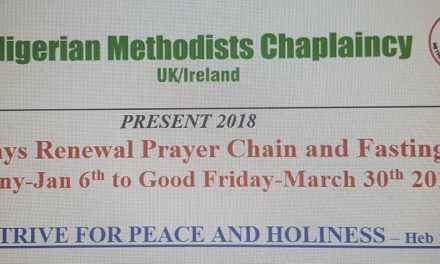Today is All Souls Day. On 31 October 1517, a monk named Martin Luther walked to a church in the German town of Wittenberg and nailed a document – his 95 theses – to its wooden doors, lighting the fuse of the Reformation. The Reformers emerged to correct the decay in the church as the pillar and foundation of truth, hence some scholars argued that it was a challenge to the Papacy centuries of compromise and abuse. Luther’s theses and protest against the official teaching and practice of the Church in Germany was a call to the church to return to the fullness of the Gospel. Beyond moral achievement, the Reformers mission was to reclaim ‘the New Testament confession that all those who have been baptised into Jesus Christ and declared righteous by grace are living saints of God.’ To achieve their mission, the Reformers affirmed five sola principles—sola scriptura, sola fides, sola gratia, solus Christus, soli Deo Gloria. The reflection on the Vision for Reforming Saints and Souls is a call to effective evangelism in our global, postmodern, scientific, and pluralistic age.
To the Reformers, the first sola principle affirmed the Scripture alone as the central and ultimate source of believers’ authority. Sola scriptura, latin word: by Scripture alone, holds that the Christian Scriptures are the Supreme authority in all matters of Christian theological doctrine and practice. It is counter-cultural and source of genuine love between God and people and between people. It is beyond paper infallibility or papal infallibility because it is God’s Spirit-inspired which never fail and can never fail. The mercy that we need for each new day is the same the same yesterday, today and forever, hence faithfulness to the Scripture in our postmodern and pluralistic age calls for trust in God, the unchanging changer. The Scripture as the Word of God’s grace points to God’s Redemption at Christ Expense (GRACE) is free and open to as many as would obey and receive him as their Lord and Saviour.
Scripture and faith goes together. The second sola principle points to the gospel of Jesus Christ that is received, through faith alone, that is, Sola Fides. Gospel and evangelism are based on confidence and certainty in God. The process of this confidence points to believing in God’s character – he is who he says; and the certainty points to believing in God’s promises, he will do what he says. We demonstrate true faith when we believe that God will fulfil his promises even though we do not see those promises materialising yet (Jn 20:24-31).
The Gospel of Jesus Christ is by God’s favour, that is by ‘grace alone,’ (Sola Gratia) – God’s Redemption At Christ Expense. However, GRACE requires our openness to divine manifestations through God’s only Son, Jesus Christ alone (Jn 3:16). According to the Reformers sola principles, Scripture, faith, and grace connects us to Christ alone (no other one), the Saviour, as the rock of our salvation. The principle of solus christus, also affirms the Body of Christ alone as the one visible agent, pillar and foundation of truth, hence ‘no salvation outside the church.’
The Scripture says that God will never share His glory with any man and this is affirmed by the fifth sola principle of the Reformer, ‘Soli Deo Gloria.’ All power and glory belong to God alone. After 500 years, we still need radical reformation in our postmodern pluralistic age, especially on this ALL SAINT/SOUL DAY in order to fully understand the fullness of the Gospel of Jesus Christ and to live into the power of the Holy Spirit in face of our decline, political, and moral complacency. The gospel of John 8:31-32 calls for our attention in order to fully understand our Reformation heritage as Saints of God: ‘If you continue in my word, you are truly my disciples; and you will know the truth, and the truth will make you free.’ To our postmodern and pluralistic age, in the light of Jesus’ words, reformation is first personal before becoming corporate. As disciples of Jesus Christ and Saints of God, to be fee from death, sin, anxiety, immoral practices and others vices is to live in freedom just as the Word became flesh.
The primary meaning and purpose of Reformation and ALL Saints/Souls Day calls us to stand as pillar of truth, giving thanks to God for the Saints of the past (including Luther, Wesleys, Saint Francis of Assisi, Saint Augustine of Hippo and many more) and present in eternal fellowship, and standing for the renewing heritage we share in Jesus Christ. As Reforming Saints we are called to overcome the secular and political corruption of the Festival of All Saints bearing in mind those martyrs from the early and present ‘persecutions whose names were never recorded and thus whose memory was in constant peril of being lost.’
Beloved, we are part of the Reforming Saints and Souls of God, called, commissioned, and sent to bear witness to the grace and mercy of God chiefly in and through Jesus Christ alone. Let us therefore arise in our postmodern and pluralistic age and agenda to shine as Luther, Wesley and others did, standing as agent and pillar of truth and revival. This reflection, VISION FOR REFORMING SAINTS AND SOULS is about you and me, our vision and preparation for the second coming of Jesus Christ, our gratitude, aspiration, commitment, and a reminder of our walk with God in the light of His Words. It is about setting a different standard, standard of the Kingdom instead of worldly standard. Let the vision start with you and me today, it is lived out, not only in our prayer room or comfort of our homes and churches or offices.
Wishing you a Spirit filled vision for All Reforming Saints/Souls Day in Jesus name.











Recent Comments